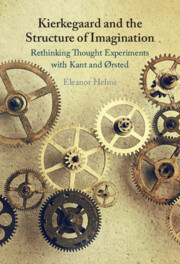Book contents
- Kierkegaard and the Structure of Imagination
- Kierkegaard and the Structure of Imagination
- Copyright page
- Contents
- Acknowledgments
- Abbreviations
- Introduction
- Part I The Origins of “Thought Experiment” in Kant and Ørsted
- Part II A Kantian Account of Thought Experiment
- Chapter 6 Varieties of Cognition
- Chapter 7 An Apparatus for Cognition
- Chapter 8 Cognizing Regulative Ideas
- Chapter 9 Bizarre Cases and Context
- Part III Kierkegaard and the Concept of Thought Experiment
- Conclusion
- Bibliography
- Index
Chapter 7 - An Apparatus for Cognition
from Part II - A Kantian Account of Thought Experiment
Published online by Cambridge University Press: 26 September 2025
- Kierkegaard and the Structure of Imagination
- Kierkegaard and the Structure of Imagination
- Copyright page
- Contents
- Acknowledgments
- Abbreviations
- Introduction
- Part I The Origins of “Thought Experiment” in Kant and Ørsted
- Part II A Kantian Account of Thought Experiment
- Chapter 6 Varieties of Cognition
- Chapter 7 An Apparatus for Cognition
- Chapter 8 Cognizing Regulative Ideas
- Chapter 9 Bizarre Cases and Context
- Part III Kierkegaard and the Concept of Thought Experiment
- Conclusion
- Bibliography
- Index
Summary
This chapter explains why cognition (Erkenntnis) is its own kind of cognitive good, apart from questions of justification. I argue against reducing the work of thought experiments to their epistemological results, such as their potential to provide prima facie justification. As an apparatus for cognition, a thought experiment enacts the three core elements of Ørsted’s Kantian account: (1) it is a tool for variation; (2) it proceeds from concepts, and (3) its goal is the genuine activation or reactivation of mental processes. Cognition has two components: givenness and thought. I will show in this chapter how givenness and thought are both achieved through thought experiments.
Keywords
Information
- Type
- Chapter
- Information
- Kierkegaard and the Structure of ImaginationRethinking Thought Experiments with Kant and Ørsted, pp. 107 - 118Publisher: Cambridge University PressPrint publication year: 2025
Accessibility standard: Inaccessible, or known limited accessibility
Why this information is here
This section outlines the accessibility features of this content - including support for screen readers, full keyboard navigation and high-contrast display options. This may not be relevant for you.Accessibility Information
Content Navigation
Allows you to navigate directly to chapters, sections, or non‐text items through a linked table of contents, reducing the need for extensive scrolling.
Provides an interactive index, letting you go straight to where a term or subject appears in the text without manual searching.
Reading Order & Textual Equivalents
You will encounter all content (including footnotes, captions, etc.) in a clear, sequential flow, making it easier to follow with assistive tools like screen readers.
You get more than just short alt text: you have comprehensive text equivalents, transcripts, captions, or audio descriptions for substantial non‐text content, which is especially helpful for complex visuals or multimedia.
Visual Accessibility
You will still understand key ideas or prompts without relying solely on colour, which is especially helpful if you have colour vision deficiencies.
You benefit from high‐contrast text, which improves legibility if you have low vision or if you are reading in less‐than‐ideal lighting conditions.
